Conference 2015 Speaker Bios

Meena Alagappan, Executive Director, Humane Education Advocates Reaching Teachers (HEART)
Meena Alagappan is the executive director of Humane Education Advocates Reaching Teachers (HEART), a non-profit full-service humane education provider based in New York City with offices in Chicago, Indianapolis and Portland, Oregon.
Meena is former chair of the animal law committees of the American Bar Association’s Tort Trial and Insurance Practice Section and the New York City Bar Association. She serves on the Board of Directors of the Mayor’s Alliance for New York City’s Animals and Pioneers for Animal Welfare Society. Prior to joining HEART, Meena was a humane education consultant for Animal Welfare Trust, a senior faculty member with Advantage Testing Inc., and an associate at Shea & Gould in Manhattan.
She is the author of “The United States Enforcement of the Convention on International Trade in Endangered Species” published in Northwestern University’s Journal of International Law and Business and co-author of “A Note on Pedagogy: Humane Education Making a Difference” in the Journal of the Institute for Critical Animal Studies.
Meena received her B.A. from Cornell University, J.D. from Northwestern University School of Law, and M.S. from Tufts University School of Veterinary Medicine.
Meena Alagappan is the executive director of Humane Education Advocates Reaching Teachers (HEART), a non-profit full-service humane education provider based in New York City with offices in Chicago, Indianapolis and Portland, Oregon.
Meena is former chair of the animal law committees of the American Bar Association’s Tort Trial and Insurance Practice Section and the New York City Bar Association. She serves on the Board of Directors of the Mayor’s Alliance for New York City’s Animals and Pioneers for Animal Welfare Society. Prior to joining HEART, Meena was a humane education consultant for Animal Welfare Trust, a senior faculty member with Advantage Testing Inc., and an associate at Shea & Gould in Manhattan.
She is the author of “The United States Enforcement of the Convention on International Trade in Endangered Species” published in Northwestern University’s Journal of International Law and Business and co-author of “A Note on Pedagogy: Humane Education Making a Difference” in the Journal of the Institute for Critical Animal Studies.
Meena received her B.A. from Cornell University, J.D. from Northwestern University School of Law, and M.S. from Tufts University School of Veterinary Medicine.

Bob Baker, Executive Director, Missouri Alliance for Animal Legislation
Bob Baker has been active in animal welfare for over four decades. His work on investigations, legislative initiatives, and his advocacy efforts on behalf of animals has been widely acclaimed. Bob brings extensive experience to the Alliance, having worked for both national and local humane organizations during his career. While at the ASPCA, he played a key role in efforts to combat the cruelties of puppy mills and to affect the passage of precedent setting legislation in Pennsylvania regulating large-scale commercial dog breeding operations. In addition, Bob served as Chief Investigator for the Humane Society of the United States for many years.
His investigations into animal fighting ventures led to the arrests of more than 1000 individuals. He also spearheaded an extensive investigation into the commercial dog breeding industry, inspecting more than 1000 puppy mills during the past thirty years. These efforts generated a tremendous amount of national publicity, the closing of numerous puppy mills, probes by the federal government’s General Accounting Office and the Office of Inspector General, and the closing of the nation’s largest pet store chain, Docktors Pet Center. While as an investigator for Humane Farming Association, Bob uncovered wide-scale abuses at some of the largest hog and dairy operations in the country.
Bob not only fought to expose cruelty but lobbied to enact laws to prevent such abuse in the future. He initiated and worked on local, state, and federal legislation to improve the welfare of animals. His efforts led to the successful passage of legislation in forty-two states, through direct lobbying activity as well as grassroots lobbying efforts, including the passage of stricter animal abuse laws for puppy mills, pet stores, dog fighting, cockfighting, horse racing and dog racing. He also worked on regulatory initiatives and increased enforcement efforts by federal and state government agencies.
Most recently, Bob was actively involved in the Prop B campaign against puppy mills in Missouri and was instrumental in the subsequent passage of the Canine Cruelty Prevention Act. Bob also successfully lobbied for increased enforcement efforts on puppy mills by state officials. The new law combined with enhanced enforcement has led to the closure of 1,200 puppy mills in Missouri over the past few years.
Bob conceived and aided in the production of several national news exposes on animal abuse including pieces on “60 Minutes,” “20/20,” “Dateline,” and “HBO.”
Prior to working in animal welfare, Bob owned and raced both thoroughbred and standardbred horses. First-hand observation of the drug abuse practices in horse racing prompted him to write the book, The Misuse of Drugs in Horse Racing, which resulted in major reforms in the horse racing industry.
Bob Baker has been active in animal welfare for over four decades. His work on investigations, legislative initiatives, and his advocacy efforts on behalf of animals has been widely acclaimed. Bob brings extensive experience to the Alliance, having worked for both national and local humane organizations during his career. While at the ASPCA, he played a key role in efforts to combat the cruelties of puppy mills and to affect the passage of precedent setting legislation in Pennsylvania regulating large-scale commercial dog breeding operations. In addition, Bob served as Chief Investigator for the Humane Society of the United States for many years.
His investigations into animal fighting ventures led to the arrests of more than 1000 individuals. He also spearheaded an extensive investigation into the commercial dog breeding industry, inspecting more than 1000 puppy mills during the past thirty years. These efforts generated a tremendous amount of national publicity, the closing of numerous puppy mills, probes by the federal government’s General Accounting Office and the Office of Inspector General, and the closing of the nation’s largest pet store chain, Docktors Pet Center. While as an investigator for Humane Farming Association, Bob uncovered wide-scale abuses at some of the largest hog and dairy operations in the country.
Bob not only fought to expose cruelty but lobbied to enact laws to prevent such abuse in the future. He initiated and worked on local, state, and federal legislation to improve the welfare of animals. His efforts led to the successful passage of legislation in forty-two states, through direct lobbying activity as well as grassroots lobbying efforts, including the passage of stricter animal abuse laws for puppy mills, pet stores, dog fighting, cockfighting, horse racing and dog racing. He also worked on regulatory initiatives and increased enforcement efforts by federal and state government agencies.
Most recently, Bob was actively involved in the Prop B campaign against puppy mills in Missouri and was instrumental in the subsequent passage of the Canine Cruelty Prevention Act. Bob also successfully lobbied for increased enforcement efforts on puppy mills by state officials. The new law combined with enhanced enforcement has led to the closure of 1,200 puppy mills in Missouri over the past few years.
Bob conceived and aided in the production of several national news exposes on animal abuse including pieces on “60 Minutes,” “20/20,” “Dateline,” and “HBO.”
Prior to working in animal welfare, Bob owned and raced both thoroughbred and standardbred horses. First-hand observation of the drug abuse practices in horse racing prompted him to write the book, The Misuse of Drugs in Horse Racing, which resulted in major reforms in the horse racing industry.

Carol Bradley, Author
Carol Bradley spent 26 years as a government and investigative reporter in Tennessee, New York, Washington D.C. and Montana. After covering an egregious puppy mill case for the Great Falls Tribune in 2003, she studied animal law as a 2004 Nieman Fellow at Harvard and left newspapering to write “Saving Gracie: How one dog escaped the shadowy world of American Puppy Mills” (Wiley, 2010). Her second book, “Last Chain on Billie: How One Extraordinary Elephant Escaped the Big Top” was published in 2014 by St. Martin’s Press. She lives in Great Falls, Montana with her husband and three rescued dogs.
Carol Bradley spent 26 years as a government and investigative reporter in Tennessee, New York, Washington D.C. and Montana. After covering an egregious puppy mill case for the Great Falls Tribune in 2003, she studied animal law as a 2004 Nieman Fellow at Harvard and left newspapering to write “Saving Gracie: How one dog escaped the shadowy world of American Puppy Mills” (Wiley, 2010). Her second book, “Last Chain on Billie: How One Extraordinary Elephant Escaped the Big Top” was published in 2014 by St. Martin’s Press. She lives in Great Falls, Montana with her husband and three rescued dogs.

Sande Buhai, Clinical Professor of Law and Director of Public
Interest Department, Loyola Law School, Los Angeles
Upon graduation from law school, Buhai served as a Research Attorney for the Los Angeles Superior Court. She was then appointed Deputy Attorney General for the State of California, serving in the Civil Licensing section for five years. She joined the Loyola faculty in 1989, first as Visiting Professor and Executive Director of the Western Law Center for Disability Rights, then as Clinical Professor and Director of the Public Interest Law Department. In 2005, she received the AALS Section on Pro Bono and Public Service Opportunity’s Father Robert Drinan Award for her work on behalf of public interest law.
Upon graduation from law school, Buhai served as a Research Attorney for the Los Angeles Superior Court. She was then appointed Deputy Attorney General for the State of California, serving in the Civil Licensing section for five years. She joined the Loyola faculty in 1989, first as Visiting Professor and Executive Director of the Western Law Center for Disability Rights, then as Clinical Professor and Director of the Public Interest Law Department. In 2005, she received the AALS Section on Pro Bono and Public Service Opportunity’s Father Robert Drinan Award for her work on behalf of public interest law.

Robert “Bob” Ferber, Animal Welfare Attorney (Former L.A. City Prosecutor)
Born and raised in New York, Bob graduated from Franklin & Marshall College and Columbia University School of Law. Bob moved to Los Angeles in 1977 and began his career as a prosecuting attorney. He developed unique specialties in human trafficking, the mentally ill and street gangs. At the same time, Bob developed a passion for rescuing countless disabled and unwanted dogs and cats.
In 1999, Bob was diagnosed with an advanced form of leukemia and given 9-12 months to live. The only treatment was a bone marrow transplant. Bob was facing imminent death when a donor was finally located. But when Bob learned he would have to give up all his animals to protect his immune system, he shocked everyone by refusing to give up his animals and cancelled the transplant. As he and his family prepared for his demise, to everyone’s surprise an experimental drug whose inventor said would not help him, put him in full remission, lasting to this day. Bob’s recovery story and his love of animals was eventually profiled in the May 2001 issue of Time Magazine.
After returning to work in 2001, Bob became the first full-time animal cruelty prosecutor in the nation. He was instrumental in forming the Los Angeles Animal Cruelty Task Force and developed training and procedures now used by prosecutors nationwide. He’s since retired from government but is busy volunteering and serving on the Board of the Cancer Support Community as well as serving on the Boards of several animal non-profits. He is also training Ventura County’s first team of animal cruelty investigators in cooperation with the Ventura County District Attorney’s Office. Bob is also a consultant to tv and film productions and continues to rescue unwanted dogs and cats. He can be reached at [email protected]
Born and raised in New York, Bob graduated from Franklin & Marshall College and Columbia University School of Law. Bob moved to Los Angeles in 1977 and began his career as a prosecuting attorney. He developed unique specialties in human trafficking, the mentally ill and street gangs. At the same time, Bob developed a passion for rescuing countless disabled and unwanted dogs and cats.
In 1999, Bob was diagnosed with an advanced form of leukemia and given 9-12 months to live. The only treatment was a bone marrow transplant. Bob was facing imminent death when a donor was finally located. But when Bob learned he would have to give up all his animals to protect his immune system, he shocked everyone by refusing to give up his animals and cancelled the transplant. As he and his family prepared for his demise, to everyone’s surprise an experimental drug whose inventor said would not help him, put him in full remission, lasting to this day. Bob’s recovery story and his love of animals was eventually profiled in the May 2001 issue of Time Magazine.
After returning to work in 2001, Bob became the first full-time animal cruelty prosecutor in the nation. He was instrumental in forming the Los Angeles Animal Cruelty Task Force and developed training and procedures now used by prosecutors nationwide. He’s since retired from government but is busy volunteering and serving on the Board of the Cancer Support Community as well as serving on the Boards of several animal non-profits. He is also training Ventura County’s first team of animal cruelty investigators in cooperation with the Ventura County District Attorney’s Office. Bob is also a consultant to tv and film productions and continues to rescue unwanted dogs and cats. He can be reached at [email protected]

Christopher E. Grimes, Director, DOG BY DOG Documentary
Christopher Grimes started 5414 Productions in 2008 with his wife Leigh Cavich-Grimes. Their goal: to build a small, independent production company focused exclusively on documentaries that deal with complex issues in public policy from both a macro and micro perspective. In April 2013, Christopher and Leigh made the bold decision to create a new non-profit entity: 5414 Productions, Inc. This change will allow 5414 to maintain it’s original mission of producing educational documentaries that deal with complex issues in public policy, while allowing us to reach a much broader pool of financial resources, including grants and donations. 5414 Productions, Inc. is an Illinois not-for-profit corporation. With experience in both government as politics, as well as a Master’s degree in Public Policy and Administration from Northwestern University, Christopher brings a unique set of real world and research skills to his projects. His directorial debut, an award-winning documentary called A SECOND KNOCK AT THE DOOR, is now available on Netflix and Amazon.
Christopher comes to the Dog By Dog Project not as a dog owner but as firm believer in best practices and humane treatment. A self-confessed burger lover, he is not interested in halting the use and monetization of animals in the United States; instead, he believes that an engaged, ethically-minded, and enthusiastic public can sway politics and business so that animals bred for companionship can live in safe, comfortable, and happy homes from the start.
As a teenager, Chris had a beagle named Apollo who could open the refrigerator. After an unfortunate incident involving an entire ham and cheese casserole, the family had to tie the fridge closed every night.
Find out more about Chris and his other projects on his website (www.5414productions.com), Twitter (twitter.com/5414productions) and Facebook (www.facebook.com/5414productions).
Christopher Grimes started 5414 Productions in 2008 with his wife Leigh Cavich-Grimes. Their goal: to build a small, independent production company focused exclusively on documentaries that deal with complex issues in public policy from both a macro and micro perspective. In April 2013, Christopher and Leigh made the bold decision to create a new non-profit entity: 5414 Productions, Inc. This change will allow 5414 to maintain it’s original mission of producing educational documentaries that deal with complex issues in public policy, while allowing us to reach a much broader pool of financial resources, including grants and donations. 5414 Productions, Inc. is an Illinois not-for-profit corporation. With experience in both government as politics, as well as a Master’s degree in Public Policy and Administration from Northwestern University, Christopher brings a unique set of real world and research skills to his projects. His directorial debut, an award-winning documentary called A SECOND KNOCK AT THE DOOR, is now available on Netflix and Amazon.
Christopher comes to the Dog By Dog Project not as a dog owner but as firm believer in best practices and humane treatment. A self-confessed burger lover, he is not interested in halting the use and monetization of animals in the United States; instead, he believes that an engaged, ethically-minded, and enthusiastic public can sway politics and business so that animals bred for companionship can live in safe, comfortable, and happy homes from the start.
As a teenager, Chris had a beagle named Apollo who could open the refrigerator. After an unfortunate incident involving an entire ham and cheese casserole, the family had to tie the fridge closed every night.
Find out more about Chris and his other projects on his website (www.5414productions.com), Twitter (twitter.com/5414productions) and Facebook (www.facebook.com/5414productions).

Nicole Herft, Ph.D., J.D., Senior Associate, Winston & Strawn LLP & Chair, Animal Law Guild
Nicole Herft is a senior associate attorney in the Los Angeles office of Winston & Strawn LLP where she concentrates her practice on intellectual property and complex commercial litigation, including trademark and copyright, false advertising, unfair competition, financial services, and other business torts and contract disputes.
Nicole is also passionate about animal protection and devotes a significant amount of pro bono time to animal law issues. As such, Nicole co-founded and is Chair of the Animal Law Guild and has represented animal protection organizations in various pro bono matters. An active member of the American Bar Association’s Animal Law Committee, Nicole has written several lead articles for their newsletter, including: “Antibiotic-Resistant ‘Superbugs’: The Link Between Animal Protection and Human Health” (2015), “Milestone Decisions by Oregon Supreme Court Signal Legal Status of Animals Moving Beyond Mere ‘Property’ Status” (2014), “‘Ag Gag’ Laws: Will Courts Decide Criminalizing Undercover Investigations at Factory Farms is Unconstitutional?” (2014), and “Assistance Animals in ‘No Pets’ Housing Under The Fair Housing Amendments Act” (2013). Nicole is also a member of the Executive Board of the National Coalition on Violence Against Animals (NCOVAA), has previously served as Chair of the Animal Legal Defense Fund’s Los Angeles regional attorney network, and has provided volunteer assistance to the Los Angeles Animal Services Department.
In addition to representing animal protection organizations in pro bono matters, Nicole has represented a class action of people with disabilities unable to access court facilities and programs, an immigrant seeking political asylum, and a prisoner in a habeas matter.
Before becoming an attorney, Nicole had a successful career as an organizational psychologist specializing in market research, brand strategy and strategic planning. She ran her own consulting business while attending Loyola Law School’s evening program where she graduated 1st in her class. Nicole has a B.A. from the University of California at Davis, an M.A. from California State University, Sacramento, a Ph.D. in Industrial/Organizational Psychology from The Ohio State University, and a J.D., summa cum laude, from Loyola Law School.
Nicole Herft is a senior associate attorney in the Los Angeles office of Winston & Strawn LLP where she concentrates her practice on intellectual property and complex commercial litigation, including trademark and copyright, false advertising, unfair competition, financial services, and other business torts and contract disputes.
Nicole is also passionate about animal protection and devotes a significant amount of pro bono time to animal law issues. As such, Nicole co-founded and is Chair of the Animal Law Guild and has represented animal protection organizations in various pro bono matters. An active member of the American Bar Association’s Animal Law Committee, Nicole has written several lead articles for their newsletter, including: “Antibiotic-Resistant ‘Superbugs’: The Link Between Animal Protection and Human Health” (2015), “Milestone Decisions by Oregon Supreme Court Signal Legal Status of Animals Moving Beyond Mere ‘Property’ Status” (2014), “‘Ag Gag’ Laws: Will Courts Decide Criminalizing Undercover Investigations at Factory Farms is Unconstitutional?” (2014), and “Assistance Animals in ‘No Pets’ Housing Under The Fair Housing Amendments Act” (2013). Nicole is also a member of the Executive Board of the National Coalition on Violence Against Animals (NCOVAA), has previously served as Chair of the Animal Legal Defense Fund’s Los Angeles regional attorney network, and has provided volunteer assistance to the Los Angeles Animal Services Department.
In addition to representing animal protection organizations in pro bono matters, Nicole has represented a class action of people with disabilities unable to access court facilities and programs, an immigrant seeking political asylum, and a prisoner in a habeas matter.
Before becoming an attorney, Nicole had a successful career as an organizational psychologist specializing in market research, brand strategy and strategic planning. She ran her own consulting business while attending Loyola Law School’s evening program where she graduated 1st in her class. Nicole has a B.A. from the University of California at Davis, an M.A. from California State University, Sacramento, a Ph.D. in Industrial/Organizational Psychology from The Ohio State University, and a J.D., summa cum laude, from Loyola Law School.
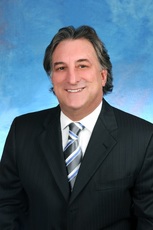
Thomas G. Kelch, Professor of Law, Whittier Law School
Tom Kelch is a professor of law at Whittier Law School in Costa Mesa, California and has been teaching animal law for more than 20 years. He has published numerous articles on animal law, including pieces on culture and animal law, the property status of animals, the role of feminist theory and the emotive in animal law, the history of animal law, and alleged First Amendment justifications for animal experimentation. Professor Kelch has also spoken at numerous conferences in the United States and Europe on animal law issues. For more than ten years, he taught International and Comparative Animal Law in Santander, Spain and Toulouse, France and has recently written a book on this subject, Globalization and Animal Law. Professor Kelch graduated from the University of Michigan Law School, has a M.B.A. from the University of Southern California and a M.A. in Philosophy from University of California Irvine.
Tom Kelch is a professor of law at Whittier Law School in Costa Mesa, California and has been teaching animal law for more than 20 years. He has published numerous articles on animal law, including pieces on culture and animal law, the property status of animals, the role of feminist theory and the emotive in animal law, the history of animal law, and alleged First Amendment justifications for animal experimentation. Professor Kelch has also spoken at numerous conferences in the United States and Europe on animal law issues. For more than ten years, he taught International and Comparative Animal Law in Santander, Spain and Toulouse, France and has recently written a book on this subject, Globalization and Animal Law. Professor Kelch graduated from the University of Michigan Law School, has a M.B.A. from the University of Southern California and a M.A. in Philosophy from University of California Irvine.
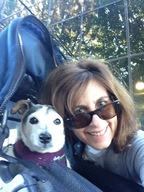
Deborah Knaan, Deputy District Attorney and Supervisor, Animal Cruelty Division at Los Angeles County District Attorney's Office
Deborah Knaan has been a Deputy District Attorney since 1996. Her assignments have included prosecuting hardcore gang crimes and sexual assaults and child molestation.
In 2004 Ms. Knaan was appointed to the Los Angeles City Board of Commissioners for the Los Angeles Department of Animal Services by Mayor Jim Hahn. As a commissioner, Ms. Knaan was responsible for overseeing and setting policy for the Department of Animal Services, hearing appeals in cases involving issues that pertained to animals and public safety, drafting and approving local ordinances, and reviewing city contracts.
In 2006 Ms. Knaan was given a leave of absence from the District Attorney’s Office to serve as Assistant General Manager of Operations for the Department of Animal Services. In that position Ms. Knaan oversaw the day-to-day operations of the six City-run animal shelters and supervised the field officers who were responsible for enforcing various animal related offenses and investigating incidents of animal cruelty.
In 2007 Ms. Knaan returned to the District Attorney’s Office to create and head up the office’s first animal cruelty prosecution program, the only one of its kind in the country. The program is responsible for all of the felony animal cruelty cases within the County of Los Angeles, and many of the misdemeanors.
The hallmark of the animal cruelty program is the 28 trained prosecutors who are specially assigned to handle animal abuse cases. Ms. Knaan trains and oversees these prosecutors, and insures that cases in which an animal is mistreated is investigated, reviewed, and filed appropriately. For her efforts, Ms. Knaan and the unit she created have received numerous awards, including recent recognition by the Los Angeles County Quality and Productivity Commission.
Ms. Knaan regularly trains prosecutors from other agencies, as well as animal control and law enforcement officers, on various aspects of investigating and prosecuting animal cruelty cases, “from crime scene to courtroom.” She is frequently invited to speak at professional conferences, and to agencies and groups that play a critical role in recognizing, reporting, or investigating animal cruelty cases.
During her tenure as the supervisor of the animal cruelty division, Ms. Knaan has devised and implemented many programs, including a dog fighting tip line and a public awareness campaign that warns members of the public of the dangers (and illegality) of leaving animals in hot vehicles. This year Westfield malls will be partnering with the D.A.’s Office on this campaign, which will help further spread the word that leaving an animal in a hot car can be deadly. Ms. Knaan has also authored legislation that strengthens protections afforded to animals under the law.
Deborah Knaan has been a Deputy District Attorney since 1996. Her assignments have included prosecuting hardcore gang crimes and sexual assaults and child molestation.
In 2004 Ms. Knaan was appointed to the Los Angeles City Board of Commissioners for the Los Angeles Department of Animal Services by Mayor Jim Hahn. As a commissioner, Ms. Knaan was responsible for overseeing and setting policy for the Department of Animal Services, hearing appeals in cases involving issues that pertained to animals and public safety, drafting and approving local ordinances, and reviewing city contracts.
In 2006 Ms. Knaan was given a leave of absence from the District Attorney’s Office to serve as Assistant General Manager of Operations for the Department of Animal Services. In that position Ms. Knaan oversaw the day-to-day operations of the six City-run animal shelters and supervised the field officers who were responsible for enforcing various animal related offenses and investigating incidents of animal cruelty.
In 2007 Ms. Knaan returned to the District Attorney’s Office to create and head up the office’s first animal cruelty prosecution program, the only one of its kind in the country. The program is responsible for all of the felony animal cruelty cases within the County of Los Angeles, and many of the misdemeanors.
The hallmark of the animal cruelty program is the 28 trained prosecutors who are specially assigned to handle animal abuse cases. Ms. Knaan trains and oversees these prosecutors, and insures that cases in which an animal is mistreated is investigated, reviewed, and filed appropriately. For her efforts, Ms. Knaan and the unit she created have received numerous awards, including recent recognition by the Los Angeles County Quality and Productivity Commission.
Ms. Knaan regularly trains prosecutors from other agencies, as well as animal control and law enforcement officers, on various aspects of investigating and prosecuting animal cruelty cases, “from crime scene to courtroom.” She is frequently invited to speak at professional conferences, and to agencies and groups that play a critical role in recognizing, reporting, or investigating animal cruelty cases.
During her tenure as the supervisor of the animal cruelty division, Ms. Knaan has devised and implemented many programs, including a dog fighting tip line and a public awareness campaign that warns members of the public of the dangers (and illegality) of leaving animals in hot vehicles. This year Westfield malls will be partnering with the D.A.’s Office on this campaign, which will help further spread the word that leaving an animal in a hot car can be deadly. Ms. Knaan has also authored legislation that strengthens protections afforded to animals under the law.

Christina Ksoll, Executive Producer, DOG BY DOG Documentary
Christina Ksoll’s work to educate others about puppy mills has been a long evolution. She has always had and loved family dogs, but working with therapy dogs in a juvenile detention center as a volunteer for 12 years allowed her to see the power of dogs. Christina was on the board of a high tech, no-kill shelter, for almost a decade and her hands-on experience there exposed her to truths about how people can treat animals. More than that, it opened her eyes to how legislation impacts animal welfare. Chris’ first adoption, Louie, was a Katrina puppy rescue who survived at only one month old. Her next adoptee, Brady, was a puppy mill puppy, who continues to respond to love despite the psychological damage inflicted on him at the mill. The final (so far) addition to the family is a breeder girl, Kumiko, who was used and ravaged almost to the point of death by a puppy mill. Chris promises her doggie diva every day that she will do something to help end the sheer and absolute torture that occurs every single minute of life in a puppy mill. Kumiko inspired Chris to make this documentary.Being a part of the Dog By Dog project is just one part of Chris fulfilling her commitment to Kumiko. Fostering Shiba Inus is a constant. Whoever needs to get out of the mills is welcome. Chris is also connected to countless transporters, transport groups, shelters and rescues locally and nationally, for cross posting, sharing and networking to save lives. In her day job, she is committed to and equally passionate about her clients and her Kellogg MBA network.
Christina Ksoll’s work to educate others about puppy mills has been a long evolution. She has always had and loved family dogs, but working with therapy dogs in a juvenile detention center as a volunteer for 12 years allowed her to see the power of dogs. Christina was on the board of a high tech, no-kill shelter, for almost a decade and her hands-on experience there exposed her to truths about how people can treat animals. More than that, it opened her eyes to how legislation impacts animal welfare. Chris’ first adoption, Louie, was a Katrina puppy rescue who survived at only one month old. Her next adoptee, Brady, was a puppy mill puppy, who continues to respond to love despite the psychological damage inflicted on him at the mill. The final (so far) addition to the family is a breeder girl, Kumiko, who was used and ravaged almost to the point of death by a puppy mill. Chris promises her doggie diva every day that she will do something to help end the sheer and absolute torture that occurs every single minute of life in a puppy mill. Kumiko inspired Chris to make this documentary.Being a part of the Dog By Dog project is just one part of Chris fulfilling her commitment to Kumiko. Fostering Shiba Inus is a constant. Whoever needs to get out of the mills is welcome. Chris is also connected to countless transporters, transport groups, shelters and rescues locally and nationally, for cross posting, sharing and networking to save lives. In her day job, she is committed to and equally passionate about her clients and her Kellogg MBA network.
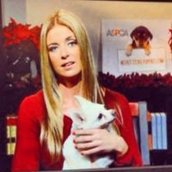
Gina Miller, Esq., Manager, Puppy Mills Campaign, ASPCA Anti-Cruelty
Gina Miller is currently the Manager of the Puppy Mills Campaign for the ASPCA’s Anti-Cruelty team, where she works to tackle puppy mills on both the state and national levels while maintaining our mission to raise awareness and educate the public. Prior to joining the ASPCA in 2012, Gina worked at the International Fund for Animal Welfare, focusing on big cats, puppy mills, and wildlife crimes in her role as Legislative Policy Analyst.
Gina obtained her B.A. in Government and Public Policy from the University of Baltimore and her J.D. from the University of Baltimore School Of Law, where she was the President of the Student Animal Legal Defense Fund (SALDF) law school chapter. She serves as a Section Council Member and she serves on the Council as the Secretary for the Animal Law Section of the Maryland State Bar Association and has played a key role in establishing the now widely noted symposium highlighting Maryland animal law and policy.
In addition to her work at the ASPCA, Gina is a volunteer for her local shelter, the Baltimore Animal Rescue and Care Society (BARCS). She lives in Baltimore with her two rescue dogs, Cookie and Kiwi.
Gina Miller is currently the Manager of the Puppy Mills Campaign for the ASPCA’s Anti-Cruelty team, where she works to tackle puppy mills on both the state and national levels while maintaining our mission to raise awareness and educate the public. Prior to joining the ASPCA in 2012, Gina worked at the International Fund for Animal Welfare, focusing on big cats, puppy mills, and wildlife crimes in her role as Legislative Policy Analyst.
Gina obtained her B.A. in Government and Public Policy from the University of Baltimore and her J.D. from the University of Baltimore School Of Law, where she was the President of the Student Animal Legal Defense Fund (SALDF) law school chapter. She serves as a Section Council Member and she serves on the Council as the Secretary for the Animal Law Section of the Maryland State Bar Association and has played a key role in establishing the now widely noted symposium highlighting Maryland animal law and policy.
In addition to her work at the ASPCA, Gina is a volunteer for her local shelter, the Baltimore Animal Rescue and Care Society (BARCS). She lives in Baltimore with her two rescue dogs, Cookie and Kiwi.

Elizabeth Oreck, National Manager, Puppy Mill Initiatives, Best Friends Animal Society
Elizabeth Oreck is the national manager of Best Friends Animal Society’s puppy mill initiatives, which address the puppy mill crisis in the U.S. through education, advocacy and legislation. Although she joined Best Friends in 2008, Elizabeth has worked in animal welfare for over 15 years, having entered the field as a managing director for spcaLA. She is a wildlife rehabilitator who has served on the boards of the California Wildlife Center, Pets90210 and the Coalition for Pets and Public Safety, as well as the Regional Council of the International Fund for Animal Welfare (IFAW).
Because she strongly believes that legislative reform is a key component of animal welfare solutions, Elizabeth has worked on state and local legislation throughout the country. In the past several years, she has been instrumental in the passage of a number of ordinances to ban the retail sale of puppy and kitten mill animals in pet stores, including Los Angeles, San Diego and Chicago. A student of martial arts for 18 years, she holds a black belt in Tae Kwon Do, and in her spare time runs marathons to raise money and awareness for various animal charities.
Elizabeth Oreck is the national manager of Best Friends Animal Society’s puppy mill initiatives, which address the puppy mill crisis in the U.S. through education, advocacy and legislation. Although she joined Best Friends in 2008, Elizabeth has worked in animal welfare for over 15 years, having entered the field as a managing director for spcaLA. She is a wildlife rehabilitator who has served on the boards of the California Wildlife Center, Pets90210 and the Coalition for Pets and Public Safety, as well as the Regional Council of the International Fund for Animal Welfare (IFAW).
Because she strongly believes that legislative reform is a key component of animal welfare solutions, Elizabeth has worked on state and local legislation throughout the country. In the past several years, she has been instrumental in the passage of a number of ordinances to ban the retail sale of puppy and kitten mill animals in pet stores, including Los Angeles, San Diego and Chicago. A student of martial arts for 18 years, she holds a black belt in Tae Kwon Do, and in her spare time runs marathons to raise money and awareness for various animal charities.

Sherry Ramsey, Director of Animal Cruelty Prosecutions, The Humane Society of the United States
Sherry Ramsey is a licensed attorney in New York and New Jersey. She is employed by the Humane Society of the United States as Director of Animal Cruelty Prosecutions, where she focuses on training law enforcement, prosecutors and judges on animal cruelty and fighting cases and working with prosecutors from around the country on effective cruelty prosecutions. Ms. Ramsey previously worked as a Prosecutor in New Jersey and then in private practice where she focused on animal law. She has served as Chair of the New Jersey Animal Law Committee and is a longtime member of the New York State Bar Committee on Animals and the Law. She has written numerous articles on prosecuting animal cruelty for legal and judicial publications including an article for United States Department of Justice website entitled, “The Implications and Risks of Animal Cruelty, and How the Criminal Justice Community Can Help.” She also writes and speaks on the subject of family violence and juvenile crime in relation to animal cruelty. In addition to frequently speaking to law enforcement, prosecutors and judicial groups, Ms. Ramsey has also been invited to speak to the FBI, the Army JAG school and the United States Department of Justice. She is on the faculty of the Association of Prosecuting Attorneys, as a member of their Animal Cruelty Advisory Committee as well as the National Coalition On Violence Against Animals in cooperation with the National Sheriffs’ Association. Ms. Ramsey is an adjunct professor teaching Animal Law at New York Law School. Her website can be found at www.humanesociety.org/justice.
Sherry Ramsey is a licensed attorney in New York and New Jersey. She is employed by the Humane Society of the United States as Director of Animal Cruelty Prosecutions, where she focuses on training law enforcement, prosecutors and judges on animal cruelty and fighting cases and working with prosecutors from around the country on effective cruelty prosecutions. Ms. Ramsey previously worked as a Prosecutor in New Jersey and then in private practice where she focused on animal law. She has served as Chair of the New Jersey Animal Law Committee and is a longtime member of the New York State Bar Committee on Animals and the Law. She has written numerous articles on prosecuting animal cruelty for legal and judicial publications including an article for United States Department of Justice website entitled, “The Implications and Risks of Animal Cruelty, and How the Criminal Justice Community Can Help.” She also writes and speaks on the subject of family violence and juvenile crime in relation to animal cruelty. In addition to frequently speaking to law enforcement, prosecutors and judicial groups, Ms. Ramsey has also been invited to speak to the FBI, the Army JAG school and the United States Department of Justice. She is on the faculty of the Association of Prosecuting Attorneys, as a member of their Animal Cruelty Advisory Committee as well as the National Coalition On Violence Against Animals in cooperation with the National Sheriffs’ Association. Ms. Ramsey is an adjunct professor teaching Animal Law at New York Law School. Her website can be found at www.humanesociety.org/justice.
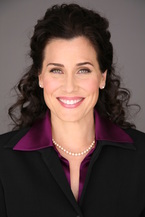
Shelley Rizzotti, Esq., Co-founder, The Animal Protectorates & Vice-Chair, Animal Law Guild
Shelley can’t ever remember a time when she didn’t have an animal in her life. She took in abandoned kittens before she was 7 years old and had her first internship when she was 10 - at a veterinarian’s office. She had horses and cows and even raised sheep to show through the 4H club. It was after winning a blue ribbon at a 4H show when she was in 8th grade that she found out what was happening to the sheep she raised - a turning point in her social awareness of the plight of animals. As an entrepreneur, Shelley started multiple companies, but even with the success, it never seemed like she was doing enough. Realizing that she could help animals through law, she set her focus on law school.
After finishing Loyola Law School, she jumped right in by working on "puppy mill" legislation in her home town of Burbank (legislation, that was ultimately passed after over a year of continuous grassroots community outreach and education). Shelley has also volunteered for the Animal Legal Defense Fund and when she was contacted by them about a hoarding case in neighboring Riverside County, she and a devoted group of animal protection advocates from varying backgrounds came together and shone a light on this situation which had gone unfettered for decades with likely thousands of animals dying. Again, through presentations at the local government level, the hoarder was arrested and will be standing trial on misdemeanor and felony animal charges. Shelley believes that grassroots efforts are critical in improving the lives of animals and she considers a law degree another arrow in the quiver in protecting them.
Shelley's message about the animal protection movement is that “effective animal advocates come from all different backgrounds and walks of life - political, religious, economic - the most important thing we can remember as a whole is to present ourselves professionally and focus on our commonalities and not our differences in order to move the law forward for animals.” In 2013, Shelley was recognized as Burbank’s Best Attorney by The Burbank Leader for her work in animal welfare.
Shelley is the Co-Founder and Treasurer of The Animal Protectorates - TAPS and serves as Vice-Chair of the Animal Law Guild, the advocacy arm of The Animal Protectorates. Shelley has previously served as Vice-Chair of Animal Legal Defense Fund - Los Angeles. She is also a member of the American Bar Association’s Animal Law Committee.
Shelley regularly fosters orphaned animals and also serves her community as the Vice-President of the Burbank Police Foundation.
Shelley can’t ever remember a time when she didn’t have an animal in her life. She took in abandoned kittens before she was 7 years old and had her first internship when she was 10 - at a veterinarian’s office. She had horses and cows and even raised sheep to show through the 4H club. It was after winning a blue ribbon at a 4H show when she was in 8th grade that she found out what was happening to the sheep she raised - a turning point in her social awareness of the plight of animals. As an entrepreneur, Shelley started multiple companies, but even with the success, it never seemed like she was doing enough. Realizing that she could help animals through law, she set her focus on law school.
After finishing Loyola Law School, she jumped right in by working on "puppy mill" legislation in her home town of Burbank (legislation, that was ultimately passed after over a year of continuous grassroots community outreach and education). Shelley has also volunteered for the Animal Legal Defense Fund and when she was contacted by them about a hoarding case in neighboring Riverside County, she and a devoted group of animal protection advocates from varying backgrounds came together and shone a light on this situation which had gone unfettered for decades with likely thousands of animals dying. Again, through presentations at the local government level, the hoarder was arrested and will be standing trial on misdemeanor and felony animal charges. Shelley believes that grassroots efforts are critical in improving the lives of animals and she considers a law degree another arrow in the quiver in protecting them.
Shelley's message about the animal protection movement is that “effective animal advocates come from all different backgrounds and walks of life - political, religious, economic - the most important thing we can remember as a whole is to present ourselves professionally and focus on our commonalities and not our differences in order to move the law forward for animals.” In 2013, Shelley was recognized as Burbank’s Best Attorney by The Burbank Leader for her work in animal welfare.
Shelley is the Co-Founder and Treasurer of The Animal Protectorates - TAPS and serves as Vice-Chair of the Animal Law Guild, the advocacy arm of The Animal Protectorates. Shelley has previously served as Vice-Chair of Animal Legal Defense Fund - Los Angeles. She is also a member of the American Bar Association’s Animal Law Committee.
Shelley regularly fosters orphaned animals and also serves her community as the Vice-President of the Burbank Police Foundation.
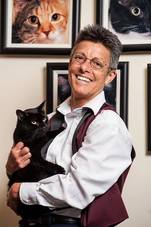
Joan Schaffner, Associate Professor of Law, George Washington University Law School
Professor Joan E. Schaffner, J.D., is an Associate Professor of Law at the George Washington University Law School. She received her B.S. in mechanical engineering (magna cum laude) and J.D. (Order of the Coif) from the University of Southern California and her M.S. in mechanical engineering from the Massachusetts Institute of Technology. She is an inactive member of the California Bar and an active member of the D.C. Bar. Professor Schaffner worked at the law firm of Irell & Manella in Los Angeles California and clerked for the Honorable Marianna Pfaelzer in the Central District of California before coming to GW Law.
Professor Schaffner teaches Civil Procedure, Remedies, and Sexuality and the Law. She is the faculty advisor to Lambda Law, the GLBT student organization at GW, and is faculty advisor and editor-in-chief of the American Intellectual Property Law Association Quarterly Journal.
Professor Schaffner directs the GW Animal Law Program which consists of the GW Animal Welfare Project (AWP), a pro bono effort of faculty and students devoted to researching and improving the lives of animal through the law; seminars in animal law; and a student chapter of the Animal Legal Defense Fund (SALDF). Professor Schaffner has presented on animal law panels at conferences world-wide.
Professor Schaffner’s most recent book entitled Introduction to Animals and the Law was published by Palgrave MacMillan in 2011 as part of their Animal Ethics Series. She is a co-author and editor of two books published by the American Bar Association: A Lawyer’s Guide to Dangerous Dog Issues (2009) and Litigating Animal Law Disputes: A Complete Guide for Lawyers (2009) and is author of the chapters “Americans Working on behalf of the UnderDOGS” in Searching for the American Dream: How a Sense of Place Shapes the Study of History (Cambridge Scholars Publishing 2013), “Canine profiling” in Global Guide to Animal Protection (Univ. Illinois Press 2013), “Animal Cruelty and the Law: Permitted Conduct” in Animal Cruelty: A Multidisciplinary Approach (Carolina Academic Press 2013) and “Laws and Policy to Address the Link of Family Violence” in The Link Between Animal Abuse and Humane Violence (Sussex Academic Press 2009). Professor Schaffner is active in various organizations including: Past Chair and Newsletter Vice-Chair, ABA TIPS Animal Law Committee; Founding Chair and Chair (2015) of the AALS Section on Animal Law; and Fellow, Oxford Centre for Animal Ethics. In August 2013 Professor Schaffner received the Excellence in the Advancement of Animal Law Award from the American Bar Association, Tort Trial & Insurance Practice Section.
On a personal note, Professor Schaffner shares her life and home with a magnificent group of felines.
Professor Joan E. Schaffner, J.D., is an Associate Professor of Law at the George Washington University Law School. She received her B.S. in mechanical engineering (magna cum laude) and J.D. (Order of the Coif) from the University of Southern California and her M.S. in mechanical engineering from the Massachusetts Institute of Technology. She is an inactive member of the California Bar and an active member of the D.C. Bar. Professor Schaffner worked at the law firm of Irell & Manella in Los Angeles California and clerked for the Honorable Marianna Pfaelzer in the Central District of California before coming to GW Law.
Professor Schaffner teaches Civil Procedure, Remedies, and Sexuality and the Law. She is the faculty advisor to Lambda Law, the GLBT student organization at GW, and is faculty advisor and editor-in-chief of the American Intellectual Property Law Association Quarterly Journal.
Professor Schaffner directs the GW Animal Law Program which consists of the GW Animal Welfare Project (AWP), a pro bono effort of faculty and students devoted to researching and improving the lives of animal through the law; seminars in animal law; and a student chapter of the Animal Legal Defense Fund (SALDF). Professor Schaffner has presented on animal law panels at conferences world-wide.
Professor Schaffner’s most recent book entitled Introduction to Animals and the Law was published by Palgrave MacMillan in 2011 as part of their Animal Ethics Series. She is a co-author and editor of two books published by the American Bar Association: A Lawyer’s Guide to Dangerous Dog Issues (2009) and Litigating Animal Law Disputes: A Complete Guide for Lawyers (2009) and is author of the chapters “Americans Working on behalf of the UnderDOGS” in Searching for the American Dream: How a Sense of Place Shapes the Study of History (Cambridge Scholars Publishing 2013), “Canine profiling” in Global Guide to Animal Protection (Univ. Illinois Press 2013), “Animal Cruelty and the Law: Permitted Conduct” in Animal Cruelty: A Multidisciplinary Approach (Carolina Academic Press 2013) and “Laws and Policy to Address the Link of Family Violence” in The Link Between Animal Abuse and Humane Violence (Sussex Academic Press 2009). Professor Schaffner is active in various organizations including: Past Chair and Newsletter Vice-Chair, ABA TIPS Animal Law Committee; Founding Chair and Chair (2015) of the AALS Section on Animal Law; and Fellow, Oxford Centre for Animal Ethics. In August 2013 Professor Schaffner received the Excellence in the Advancement of Animal Law Award from the American Bar Association, Tort Trial & Insurance Practice Section.
On a personal note, Professor Schaffner shares her life and home with a magnificent group of felines.
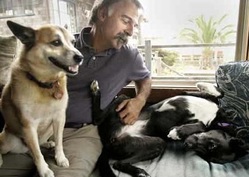
Bruce Wagman, Partner, Schiff Hardin LLP
Bruce Wagman is a partner in Schiff Hardin’s San Francisco office, with an almost exclusive focus on animal law matters, including litigation, legislative drafting and counseling, education, and private consultation. He has been active in animal law since 1992. He is a coeditor of the casebook Animal Law, and coauthor of A Worldview of Animal Law. He has been teaching Animal Law since 1996 and currently teaches on a rotating fashion at three Bay Area law schools. Bruce’s clients include numerous animal protection organizations as well as private individuals. He has worked on behalf of birds, cats, chickens, chimpanzees, cows, deer, dogs, dolphins, ducks, elephants, elk, gorillas, horses (domestic and wild), lions, mice, monkeys, pigs, sharks, turkeys, whales and wolves. The areas covered by his litigation/legislative practice have included the use of animals in entertainment, biomedical research, animal agriculture/food production, animal cruelty, animal shelters, private ownership, dog bites, animal custody, endangered species, wild horses, horse slaughter and biomedical research and wildlife control, as well as individualized cases involving injuries to, and caused by, animals. (Read more about Bruce's accomplishments for animals here.)
Bruce Wagman is a partner in Schiff Hardin’s San Francisco office, with an almost exclusive focus on animal law matters, including litigation, legislative drafting and counseling, education, and private consultation. He has been active in animal law since 1992. He is a coeditor of the casebook Animal Law, and coauthor of A Worldview of Animal Law. He has been teaching Animal Law since 1996 and currently teaches on a rotating fashion at three Bay Area law schools. Bruce’s clients include numerous animal protection organizations as well as private individuals. He has worked on behalf of birds, cats, chickens, chimpanzees, cows, deer, dogs, dolphins, ducks, elephants, elk, gorillas, horses (domestic and wild), lions, mice, monkeys, pigs, sharks, turkeys, whales and wolves. The areas covered by his litigation/legislative practice have included the use of animals in entertainment, biomedical research, animal agriculture/food production, animal cruelty, animal shelters, private ownership, dog bites, animal custody, endangered species, wild horses, horse slaughter and biomedical research and wildlife control, as well as individualized cases involving injuries to, and caused by, animals. (Read more about Bruce's accomplishments for animals here.)

Michelle Welch, Senior Assistant Attorney General, Virginia Attorney General’s Office
Michelle Welch is a Senior Assistant Attorney General in the Virginia Attorney General’s Office. She is the Director of the newly created Animal Law Unit at the Attorney General's Office. She is charged with taking all animal law questions in Virginia. She is called on by agencies all over the Commonwealth to act as a special prosecutor in animal cruelty and animal fighting cases. She has been appointed a special Assistant U.S. Attorney for the Western District of Virginia to aid in animal fighting prosecutions. She frequently gives advice to local law enforcement authorities and prosecutors all over Virginia and across the nation. She also trains prosecutors, animal control and law enforcement officers on the state of Virginia animal law. She is a frequent speaker at many conferences, including the Virginia Animal Control Association. She is the President of the Virginia Animal Fighting Taskforce. She frequently works with many animal organizations, including the Animal Welfare Institute, HSUS, ALDF and ASPCA. She is a senior faculty member for the Association of Prosecuting Attorneys (APA). She is the Chair of the Animal Law Curriculum Advisory Committee for the APA. She is adjunct faculty for Animal Law at the University of Richmond Law School and William & Mary Law School. She has testified before a Congressional Caucus examining the enforcement of animal laws and the cooperation between state and federal partners. In 2015, HSUS gave her Office, the US Attorney's Office, USDA, and ABC the Law Enforcement Award for bringing to justice one of the largest cockfighting rings in KY, which had ties to Virginia. Michelle and this dynamic team of Agents and Prosecutors worked for two years on this investigation. In 2014, she was named Prosecutor of the Year by the Association of Prosecuting Attorneys. In 2013, she was named one of the Top 10 Animal Defenders in the Nation by Animal Legal Defense Fund. She was presented with the Albert Schweitzer Medal for her work on behalf of the animals in 2012 by the Animal Welfare Institute. She has also been awarded VACA's President's Award in 2010. She has also received HSUS's Law Enforcement Award in 2008.
Michelle Welch is a Senior Assistant Attorney General in the Virginia Attorney General’s Office. She is the Director of the newly created Animal Law Unit at the Attorney General's Office. She is charged with taking all animal law questions in Virginia. She is called on by agencies all over the Commonwealth to act as a special prosecutor in animal cruelty and animal fighting cases. She has been appointed a special Assistant U.S. Attorney for the Western District of Virginia to aid in animal fighting prosecutions. She frequently gives advice to local law enforcement authorities and prosecutors all over Virginia and across the nation. She also trains prosecutors, animal control and law enforcement officers on the state of Virginia animal law. She is a frequent speaker at many conferences, including the Virginia Animal Control Association. She is the President of the Virginia Animal Fighting Taskforce. She frequently works with many animal organizations, including the Animal Welfare Institute, HSUS, ALDF and ASPCA. She is a senior faculty member for the Association of Prosecuting Attorneys (APA). She is the Chair of the Animal Law Curriculum Advisory Committee for the APA. She is adjunct faculty for Animal Law at the University of Richmond Law School and William & Mary Law School. She has testified before a Congressional Caucus examining the enforcement of animal laws and the cooperation between state and federal partners. In 2015, HSUS gave her Office, the US Attorney's Office, USDA, and ABC the Law Enforcement Award for bringing to justice one of the largest cockfighting rings in KY, which had ties to Virginia. Michelle and this dynamic team of Agents and Prosecutors worked for two years on this investigation. In 2014, she was named Prosecutor of the Year by the Association of Prosecuting Attorneys. In 2013, she was named one of the Top 10 Animal Defenders in the Nation by Animal Legal Defense Fund. She was presented with the Albert Schweitzer Medal for her work on behalf of the animals in 2012 by the Animal Welfare Institute. She has also been awarded VACA's President's Award in 2010. She has also received HSUS's Law Enforcement Award in 2008.
